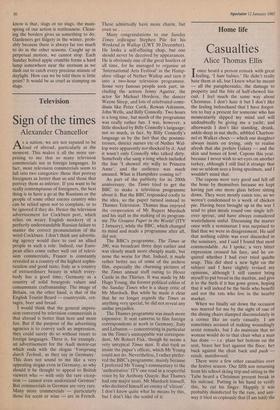Television
Sign of the times
Alexander Chancellor
As a nation, we are not reputed to be fond of abroad, particularly at the moment. This makes it all the more sur- prising to me that so many television commercials are in foreign languages. In fact, most television commercials seem to fall into two categories: those that portray foreigners as better than us and those that portray them as inferior. If you want to be really contemptuous of foreigners, the best thing is to have a go at the Russians or the people of some other enemy country who can be relied upon not to complain, or to be ignored if they do. Hence the television advertisement for Cockburn port, which relies on weary English mockery of a perfectly understandable Russian failure to master the correct pronunciation of the word Cockburn. I don't think any advertis- ing agency would dare to cast an allied people in such a role. Indeed, our Euro- pean allies come rather well out of televi- sion commercials. France is .constantly revealed as a country of the highest sophis- tication and good taste; Italy as a country of extraordinary beauty in which every- body has a good time; Germany as a country of solid bourgeois values and consummate craftsmanship. The image of Britain, on the other hand, is that of the English Tourist Board — countryside, cot- tages, beer and bread.
I would think that the general impres- sion conveyed by television commercials is that abroad is better than here and more fun. But if the purpose of the advertising agencies is to convey such an impression, they could surely do so without resort to foreign languages. There is, for example, an advertisement for the Audi motor-car which ends with the slogan `Vorsprung durch Technik, as they say in Germany.' This does not sound to me like a very appealing slogan even in Germany, so why should it be thought to appeal to British viewers who — with only the rare excep- tion — cannot even understand German? But commercials in German are very rare. Many more commercials — particularly those for scent or wine — are in French. These admittedly have more charm, but even so . . . .
Many congratulations to our Sunday .Times colleague Stephen Pile for his Weekend in Wallop (LWT 30 December). He looks a self-effacing chap, but one should never be deceived by appearances. He is obviously one of the great hustlers of all time, for he managed to organise an 'International Arts Festival' in the Hamp- shire village of Nether Wallop and turn it into a two-hour television programme. Some very famous people took part, in- cluding the actress Jenny Agutter, the actor Sir Michael Hordern, the dancer Wayne Sleep, and lots of celebrated come- dians like Peter Cook, Rowan Atkinson, John Wells, and Billy Connolly. Two hours is a long time, but much of the programme was really rather fun. I was, however, a little shocked by Billy Connolly's language; not so much, in fact, by Billy Connolly's language as by the fact that the postmis- tresses, district nurses etc of Nether Wal- lop were apparently not shocked by it. And it wasn't only Connolly who talked dirty. Somebody else sang a song which included the line 'I showed my willy to Princess Anne', and the audience was much amused. What is Hampshire coming to?
As part of the publicity for its 200th anniversary, the Times tried to get the BBC to make a television programme about it. But the BBC responded coolly to the idea, so the paper turned instead to Thames Television. Thames thus enjoyed the cooperation of Mr Rupert Murdoch and his staff in the making of its program- me The Greatest Paper in the World! (ITV 2 January), while the BBC, which changed its mind and made a programme after all, did not.
The BBC's programme, The Times at 200, was broadcast three days earlier and was clearly much more cheaply made, but none the worse for that. Indeed, it made rather better use of some of the archive film, especially the charming pictures of the Times annual staff outing to Hever Castle in the Thirties. It was made by Mr Hugo Young, the former political editor of the Sunday Times who is a sharp critic of Mr Murdoch. But while he made it clear that he no longer regards the Times as anything very special, he did not reveal any undue prejudice.
The Thames programme was much more expensive. It sent cameras to film foreign correspondents at work in Germany, Italy and Lebanon — concentrating in particular on the Times's unstoppable war correspon- dent, Mr Robert Fisk, though he seems a very untypical Times man. It also took us inside the paper's offices, which Mr Young could not do. Nevertheless, I rather prefer- red the BBC's programme, mainly because I preferred Mr Young's commentary to the 'authoritative' ITV one read in a respectful voice by Sir Anthony Quayle. But Thames had one major asset, Mr Murdoch himself, who declared himself an enemy of 'elitism'. I don't know quite what he means by this, but I don't like the sound of it.






































 Previous page
Previous page